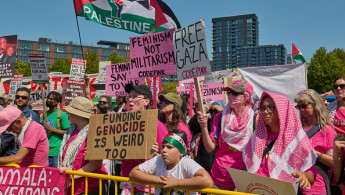56 pro-Palestine protesters arrested at DNC
Hundreds of pro-Palestinian protesters, including parents with children atop their shoulders, streamed into Union Park on the third day of the Democratic National Convention, marking a stark contrast to violent clashes between police and protesters the night before that led to 56 arrests.
Some played hacky sack Wednesday afternoon and others sat on the grass in the sun as protest leaders chanted, “The whole world is watching.”
Raed Shuk, 48, brought his children from the suburbs, including his 2-year-old son. Shuk, whose parents are Palestinian, said they have come to so many rallies that his son knows the chants by heart.
“Everybody’s humanity needs to be equally addressed here and there,” he said of Gaza. “I want to help my children learn from this experience that you always like to stand up for your rights and always peacefully protest.”
The rally near the United Center was organized by the U.S. Palestinian Community Network, a Palestinian and Arab community-based organization. It came one night after an intense standoff with Chicago police at a protest not affiliated with a coalition of more than 200 groups that has organised other permitted rallies and marches this week.
Green Party presidential candidate Jill Stein attended Wednesday's rally and criticised police use of force, calling them an “overwhelming presence.”
“This is an absolute intimidation of the American people to silence our protest” she said in an interview with The Associated Press. ”...This is an absolute violation of our basic democratic rights.”
Chicago Police Superintendent Larry Snelling said Wednesday that those arrested outside the Israeli Consulate, about 2 miles (3.2 kilometers) from the United Center where Democrats were meeting, “showed up with the intention of committing acts of violence, vandalism.”
“As the Chicago Police Department, we did everything that we could to de-escalate that situation," Snelling said during a news conference. "But there’s only so much de-escalation that you can attempt before it becomes excessive repetition.”
Thirty of the people detained by police were issued citations for disorderly conduct, according to Chicago police. One person was arrested on a felony charge of resisting police, while nine were charged with misdemeanors including disorderly conduct, resisting officers, battery, assault and criminal damage to property, police said.
The intense confrontations between pro-Palestinian protesters and officers began minutes into the demonstration, after some protesters — many dressed in black, their faces covered — charged at a line of police who had blocked their march. They eventually moved past the officers but were penned in several times throughout the night by police in riot gear who did not allow protesters to disperse.
Snelling said protesters showed up to "fight with the police."
“We were not the initiators of violence, but we responded to it," Snelling said.
Hatem Abudayyeh, co-founder of the U.S. Palestinian Community Network, put the onus on police to keep the peace when asked about the clashes between pro-Palestinian protesters and police.
The police “only have one responsibility here,” he said. “They have the responsibility of not infringing on our First Amendment rights.”
Abudayyeh led a separate march on Monday but was not an organizer of Tuesday night's demonstration outside of the Israeli Consulate.
Snelling said that two people were taken to the hospital with minor injuries, one for knee pain and one with a finger injury. Two officers were injured but they refused medical attention because they did not want to leave fellow officers, Snelling said. He said three journalists were among those arrested, but he did not have details on charges.
“Last night was a danger to our city and a danger to our citizens in this city, our residents’ property. And CPD has to protect that,” Snelling said.
The Israeli Consulate has been the site of numerous demonstrations since the war in Gaza began in October, and protests during the DNC have largely focused on opposing Israel's war on Gaza.
On Tuesday night, organisers rallied demonstrators under the slogan “Make it great like ’68,” invoking the anti-Vietnam War protests that seized the city during the 1968 Democratic National Convention.
“That was what they brought here to Chicago,” Snelling said. “It’s 2024. And the Chicago Police Department proved that. So let’s get off of 1968. Let’s stop talking about 1968. This is 2024."
A large portion of the arrests happened at the end of the night, as police pinned demonstrators in a plaza and blocked them from leaving. Snelling denied that police had “kettled” protesters, a tactic that involves corralling people in a confined area, which is banned under a federal consent decree.
Snelling, who has been present at all major demonstrations so far during the convention, praised his officers. He said some female police officers were subjected to “vicious, nasty, sexually explicit” comments but that they "stood their ground and they did what they had to do.”
"I could not be more proud of the work that the men and women of this department are doing right now to keep this city safe,” he said.
Snelling rejected criticism that the police response was overwhelming.
“We wanted to overwhelm them,” Snelling said. “We wanted to overwhelm those people who decided to come to our city and destroy it. Now, overwhelming doesn’t mean that we were excessive. The response was proportionate.”
The largest protest so far, which attracted about 3,500 people on Monday, was largely peaceful and resulted in 13 arrests, most related to a breach of security fencing. Two were arrested Sunday night during another mostly peaceful march.






 Follow the Middle East's top stories in English at The New Arab on Google News
Follow the Middle East's top stories in English at The New Arab on Google News


